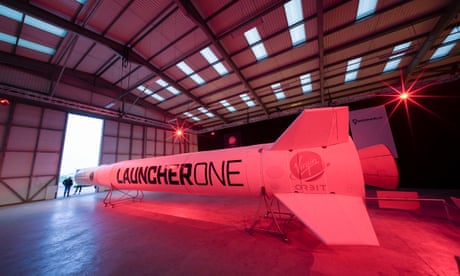In a few weeks, Britain will become a space power. A Virgin Orbit jumbo jet will take off from an airport in Cornwall, carrying a rocket strapped below one wing. As the plane flies 35,000ft above the Atlantic, it will drop its cargo, the rocket engine will be ignited, and a payload of small satellites will be hurled into Earth orbit.
The LauncherOne mission – scheduled for mid-November – is intended to be the first of many launches from centres around the UK . Up to eight Virgin Orbit flights a year will eventually take off from Spaceport Cornwall, in Newquay, it is hoped – while rockets lifting off from mainland Scotland and Shetland will also carry satellites into space in the near future. “Britain has become very good at developing and building small satellites, but to put them into orbit we have had to take them to Russia or India or the US,” said John Paffett of the Spaceport Cornwall management team.
“That is expensive, environmentally wasteful and often leads to delays. Now we can take control of the whole operation – from planning a probe to putting it into space. ” Only one UK satellite has ever been put into orbit on a British launcher: the experimental probe Prospero was blasted into space on a Black Arrow rocket in 1971 – but from Woomera in Australia.
Now that dearth is to be overturned with the creation of a satellite launch industry that the government hopes will be worth £3. 8bn to the UK economy over the next decade. Most of the launches from the UK will involve small satellites of less than 500kg.
“That usually translates into devices that range from shoebox-sized satellites to those with the dimensions of a washing machine, and they are now used widely across the world,” said Ian Annett, deputy CEO of the UK Space Agency. Virgin Orbit’s modified Boeing 747 carrying a LauncherOne rocket under its wing. The rocket is released then ignites for its journey into space.
Photograph: Patrick T Fallon/AFP/Getty Images “In 2012, about 50 small satellites were put into space. Last year, of the total 1,900 satellites that were put into orbit, 1,700 were small satellites. ” Thanks to component miniaturisation, these little probes offer nations detailed environment monitoring, weather observations, data relays and other services – uses reflected in the payloads that will be taken into space by LauncherOne.
These include Prometheus-2, a Ministry of Defence satellite; Dover, a UK navigation satellite; and ForgeStar-0, a pathfinder mission intended to lead to the opening up of drug, alloy and microelectronics manufacture in space. “If you want to make the purest alloy, then make it in space,” said Andrew Bacon, co-founder of Space Forge , the Cardiff-based company which has built ForgeStar-0. “You melt the ingredients and then combine them.
The lack of gravity means they will mix together perfectly while the lack of atmosphere means there is no danger of materials being oxidised. You get the best, the most uniform mixture. ” ‘It’s really happening’: tears of joy as space mission nears Cornwall launch Read more The company’s ForgeStar-0 will fly on LauncherOne in November but will be used merely to test onboard systems, added Bacon.
“Once we have completed that mission, we will launch ForgeStar-1, probably next year. In that, we will make real samples and return them safely to Earth. There are all sorts of incredibly pure vaccines, chemicals, drugs, alloys and microelectronics that we will be able to manufacture this way.
” Lucy Edge of Satellite Applications Catapult – which provides support for the UK space industry – added that the growing sophistication of small satellites put into orbit could lead to the construction of large structures without the involvement of astronauts. “We could also start to recycle materials in space, using bits of old satellites such as their solar panels and carbon fibres, and then recycle and repurpose them to construct other spacecraft. “There is so much that we will be able to do in space and it is vital that the UK has the capability to launch the satellites that we have designed and built.
“That is why the flight of LauncherOne is so significant. ”.
From: theguardian
URL: https://www.theguardian.com/science/2022/oct/30/first-space-launch-british-history-mini-satellites-orbit



